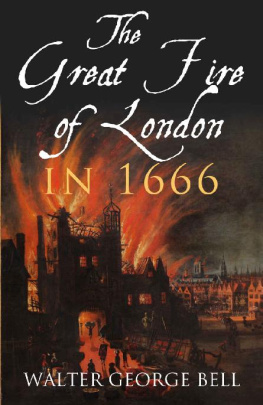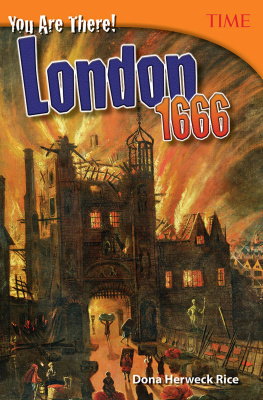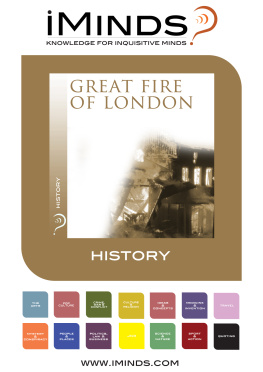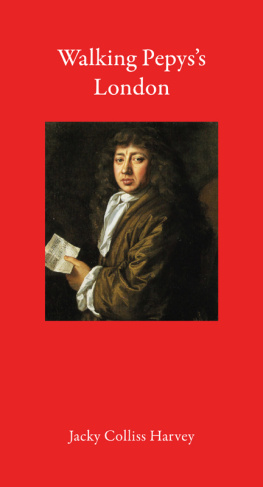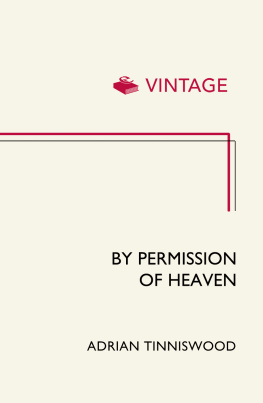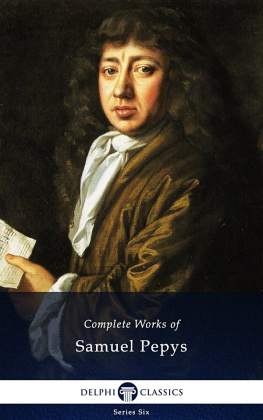PREFACE
HERE is a substantial contribution to the history of London. For two and a half centuries the Great Fire of London has awaited an historian. In view of the vast numbers of books that have been written about the Empires capital, it is surprising that there should have been no adequate account of the Fire. No other single incident in Londons record of over a thousand years has had such influence upon its fortunes and its future. The flames which burnt through the streets in those four September days of the year 1666 destroyed almost the last vestiges of past eras when the aspect of London was predominantly that of an ecclesiastical and monastic city, with commerce gathered about the walls of the religious-vestiges which the ruthlessness of Henry VIII. failed entirely to erase. Only when rebuilt upon the ruins of the Fire London became the wholly commercial city that we know.
My sources have been largely manuscript, and for those pages which describe the measures taken for meeting the distress occasioned by the catastrophe, the temporary housing of the citizens, the restoration of trade and the vastly important work of rebuilding the destroyed City, almost entirely so. The subject had not been explored, and beyond a short paper on The Rebuilding of London after the Great Fire of 1666, which I read before the Royal Institute of British Architects in 1918, I know of nothing printed. These later chapters, I believe, will prove the most useful; naturally the more dramatic narrative is in the Fire itself. Perhaps because the Great Fire of London has been so little known it has undergone popular neglect; for the destruction of the larger part of a great city by flames, leaving one hundred thousand people homeless, has possibilities which must appeal to writers of romance.
The shortcomings of this work will be known to none better than myself. None can know so well the gaps that, after the passage of centuries, I have been compelled to leave unfilled; but I offer this book, which has been a work over many years in which I have not been lacking in industry, in the belief that it will prove helpful towards a true appreciation of what the Fire of London was.
In the months that immediately followed the Fire many pamphlets and tracts were printed which professed to describe it, but the writers were more concerned in drawing a moral than in attempting to depict the scenes through which they had lived. Best of these is Thomas Vincents Gods Terrible Voice in the City , but of its 204 pages fourteen alone actually deal with the Fire. Waterhouss Short Narrative is more disappointing, however good the religious lesson read, and the proportion of facts disclosed is even smaller. The report of the Parliamentary Committee which investigated the Fire is wholly taken up with the statements of chatterboxes anxious above all things to fix the blame upon the Roman Catholics, and is only of the smallest historical value. Clarendon, Burnet, Echard, and the remaining historians of the century which succeeded the Fire devote to it a few short passages. The one vital accession to our knowledge is Pepyss Diary of the memorable days, disentombed from his shorthand script after a century and a halfs lapse. In 1769 there was put together, under the title of An Historical Narrative of the Great and Terrible Fire of London , Sept . 2nd , 1666 , a collection of clippings from the writers mentioned, the London Gazette , and a few other sources, and thereafter the subject has been allowed to rest. Dr. Lappenberg, inspired by a huge fire which occurred at Hamburg in 1842, published in that city a 32-page pamphlet, Der Grosse Brand von London , a hasty compilation by a serious historian that adds nothing to his reputation.
Some accepted statements have had to be revised. The flames started on Sunday, September 2nd, 1666, before daybreak, and it is represented in the London Gazette that the last stage of the Fire was the second outbreak in the Temple, which began on the following Thursday night. It is probable that the official account was written by James Williamson, then editor of the Gazette . It is certainly wrong. Wind. Sandys, the gentleman in personal attendance on the Duke of York, says clearly in his letter, here printed in full, that the second fire in the Temple occurred on Wednesday, and that his Royal Highness remained there until one oclock next morning when, the peril having passed, he retired to St. Jamess Palace for much needed rest. The writer of the letters in the Gough collection at the Bodleian also fixes Wednesday as the date. Pepys says the same. There is no contemporary who confirms the statement in the Gazette . Unfortunately this last has been generally followed, and the Fire has been pictured as spreading over London throughout five days, whereas in fact all the dreadful havoc it wrought was accomplished in four days, and on the Thursday nothing remained to be done but to stamp out the still smouldering embers.
No epigram is more familiar than that The Fire of London began in Pudding Lane and ended at Pie Corner. It is probably imperishable. There is an appositeness about the two names that is attractive, but in fact the flames continued to burn and spread long after Pie Corner had been levelled with the ground. It is fortunate that, where so much was destroyed, the Church registers and records of the City Companies with but rare exceptions were saved from the Fire, and the same with the plate. There are to-day among the possessions of City churches eight cups worked by London silversmiths in the reign of Edward VI., and many other valued pieces.
I have shown in the later chapters what length of years was actually taken in rebuilding London after the conflagration. If the authenticated statement runs contrary to popular belief derived from the inscription on the Fire Monument three short years complete that which was considered the work of an age the blame must be laid upon those who made that vainglorious boast, which is as false as it is foolish.
I trust there may be no clamour against me as a detractor of Sir Christopher Wren for what is here said. I yield to none in admiration of that great architect, but hold that he has not been fortunate in his biographers, and that his fame is securely based for all time upon his matchless achievement, without need of the attribution to him of many things of which he was not the creator.
The Guildhall has little in its archives about the Fire itself, but its records are invaluable for the settlement thereafter and the rebuilding of London. It is a pleasure to acknowledge the generous assistance I have received from Mr. J. Craker, who acted as Records Clerk to the Corporation during the absence on military service of Mr. Thomas, and from Mr. Bernard Kettle, the Guildhall Librarian. Next in importance are the various State papers; but indeed the field of research is very wide. Dr. Byvanck, the Librarian of the Royal Library at The Hague, was good enough to deposit on loan at Guildhall for my use the Dutch historical pamphlets in his keeping, and I am much indebted for his great courtesy. The Bibliothque Nationale in Paris proved disappointing. A few of the shorter foreign pamphlets upon the Fire Dutch, Spanish, Italian, French, German I have printed in an Appendix.

